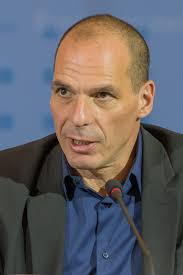Carla Rising and two models
for our future society
Today, I’m thinking about political polarization — the kind that Barack Obama tried to overcome beginning in 2004, with his speeches about “one America.” He was immediately and persistently opposed by nationalist Republicans, who benefit from a more polarized society, filled with people living in fear of “the other.”

Yanis Varoufakis
I’m listening to the views of Yanis Varoufakis, the former finance minister of Greece, now an advocate of greater democracy in the European Union. In this TED talk, Varoufakis speaks of two possible futures for society — both of which are made possible by today’s technology. To illustrate, he uses two different works of science fiction: One is the dystopian network of The Matrix, which uses technology to enslave people. The other is portrayed in Star Trek, an Athenian democracy in which technology empowers us to work across racial (and interplanetary) boundaries to explore, think about, and discuss our universe.
In my own historic novel, Carla Rising, I also consciously tried to portray the “battle line” between these two alternative visions. Carla Rising actually describes the same group of coal miners, as they live and work in two very different environments. The first was largely created for them by their employers. The second one is hammered out by the workers themselves.
the “battle line” between these two alternative visions. Carla Rising actually describes the same group of coal miners, as they live and work in two very different environments. The first was largely created for them by their employers. The second one is hammered out by the workers themselves.
Like the world of The Matrix, the economic / labor community of Sovereign, a coal camp, is a place where the dominating employer provides the “bare minimum” needed for workers to live and produce (to dig coal). The company is the only allowable
source of food, water, housing, etc. Children in Sovereign are taught by company teachers, parents buy food only at the company store, they live in the company houses, and pray in the company church. Sovereign is also policed by a private-public police force, which attends to one rule above all others: The workers shall not complain, and shall not organize themselves into any kind of resistance. (By the end of the book, Sovereign devolves into a genuine forced labor camp.)

cc: edenpictures
The other workers’ community in Carla Rising is a tent city, which I modeled, somewhat, on the tent encampment erected in 2011 by “Occupy Wall Street,” in New York. In this more democratic society, workers take part in decision-making as well as doing the work that goes along with keeping up the place. There is no central authority (not even the union). Schools are organized by parents; community meals are served by neighbors, and there is an attempt at fair distribution of goods and services, according to need. The labor union’s tent community is also diverse, bringing black and white together; European and American-born.
In our own time, when the dystopian model seems to be on the rise in the United States, I want to share Yanis Varoufakis’ expression of optimism. We can still create the more Athenian democratic model, as Wall Street occupiers did — or tried to do — several years ago.
We need only decide in its favor, says Varoufakis, and act upon it.
